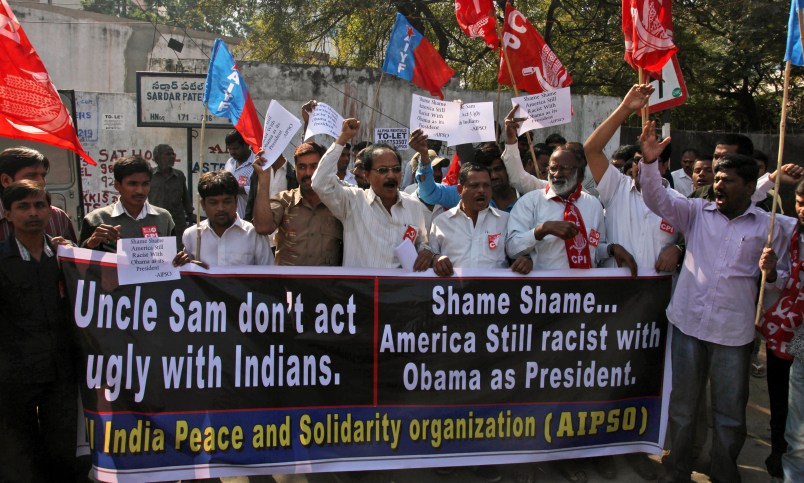NEW DELHI (AP) — India’s information minister lashed out at the United States on Friday and demanded an apology for the treatment of a diplomat who was arrested in New York, saying America cannot behave “atrociously” and get away with it.
The Dec. 13 arrest and strip-search of Devyani Khobragade, India’s deputy consul general in New York, has sparked a diplomatic storm between the United States and India. U.S. prosecutors say Khobragade lied on a visa form about how much she paid her housekeeper. The diplomat has pleaded not guilty.
India has protested Khobragade’s treatment and said the strip-search was degrading and unnecessary. The U.S. Marshals service said it is standard procedure. But in India, such treatment for an educated, middle-class woman is almost unimaginable.
“The fact is that American authorities have behaved atrociously with an Indian diplomat and obviously America has to make good for its actions,” Information Minister Manish Tewari told reporters. “I think it’s a legitimate expectation that if they have erred — and they have erred grievously in this matter — they should come forth and apologize.”
The case has become major news in India, touching on issues of class, status and the rights of domestic workers. The two sides of the case have offered starkly different accounts of what happened. Khobragade says she’s being targeted by a vindictive housekeeper. The housekeeper, meanwhile, says she was overworked and underpaid and needed to escape.
U.S. Secretary of State John Kerry has expressed regret, and State Department officials have declined to provide details about the case, citing law enforcement restrictions that prevent them from discussing it. They say they are still trying to assess what occurred.
But U.S. Attorney Preet Bharara said earlier this week that Khobragade was treated well, and questioned why there was more sympathy in India for the diplomat than the housekeeper.
U.S. Undersecretary of State Wendy Sherman spoke with Foreign Secretary Sujatha Singh for a second day Thursday.
“Both parties affirmed our intent to keep working through this complex issue. We certainly look forward to having further conversations,” U.S. State Department deputy spokeswoman Marie Harf said.
On Friday, the diplomat’s father, Uttam, said his daughter treated the housekeeper, Sangeeta Richard, like a member of the family. He said Richard had Sundays off and was free to attend church and visit her friends.
He filed a lawsuit in India earlier this year on his daughter’s behalf, saying Richard was wrongly accusing his daughter of treating her like a slave.
But Richard’s lawyer said Thursday that the housekeeper worked from morning until late at night, seven days week, for less than $3 an hour. Unable to get better pay, she made sure Khobragade’s two children were cared for one day and walked out, lawyer Dana Sussman said.
From that moment on, Sussman said, Richard relied on the kindness of strangers within the Indian community in New York City, and even was looked after at one point by a Sikh temple. She eventually connected with the nonprofit group Safe Horizon, which has an anti-trafficking program.
“She was basically just trying to find her way. She was left with the clothes on her back, with very little money,” Sussman said.
Foreign Minister Salman Khurshid has questioned the premise of the case and demanded the charges be dropped. He said Richard had threatened over the summer to go to the police unless Khobragade arranged a new passport for her, along with a work visa and a large sum of money.
Khurshid did not say how much money Richard sought. But two top Indian officials said the housekeeper asked for $10,000 in the presence of an immigration lawyer and two other witnesses. Both officials have close knowledge of the case, but spoke on condition that their names not be published because of the sensitivity of the case.
Sussman said the claims are inaccurate. “There was no extortion or anything along those lines,” she said. “She essentially worked very long hours, was isolated within the home, and attempted to ask for more time off, ask for more reasonable hours, but those attempts to resolve the issues were unsuccessful.”
Khurshid said India does not want to sour relations, but would insist on the return of its diplomat and the dropping of charges against her. “We are keen that no damage of an irreversible nature should happen to our relationship,” he said.
Khobragade could face a maximum sentence of 10 years for visa fraud and five years for making a false declaration if convicted. She is accused of submitting false documents to obtain a work visa for Richard. According to prosecutors, Khobragade claimed she paid the woman $4,500 a month, but actually paid her around $3 per hour.
Khobragade has said she had full diplomatic immunity. U.S. officials say her immunity is limited to acts performed in the exercise of consular functions.
She was transferred to India’s U.N. mission this week.
___
Associated Press writers Colleen Long in New York and Deb Riechmann in Washington contributed to this report.
Copyright 2013 The Associated Press. All rights reserved. This material may not be published, broadcast, rewritten or redistributed.



